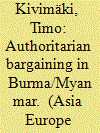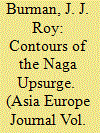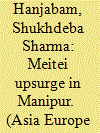|
|
|
Sort Order |
|
|
|
Items / Page
|
|
|
|
|
|
|
| Srl | Item |
| 1 |
ID:
082023


|
|
|
|
|
| Publication |
2008.
|
| Summary/Abstract |
Despite the political controversy related to the authoritarian bargaining of Burma/Myanmar's territorial conflicts, it is important to acknowledge the successes and admit the failures of the process of ceasefire negotiation and the national convention process of the Myanmar-government. Regardless of what we think of the Myanmar government, there can still be both good and bad elements in the process. This article will focus, as the general focus of this special issue suggests, on the negotiations between the central government and the ethnic groups on autonomy and territorial solutions in the peripheries of Burma/Myanmar
|
|
|
|
|
|
|
|
|
|
|
|
|
|
|
|
| 2 |
ID:
082026


|
|
|
|
|
| Publication |
2008.
|
| Summary/Abstract |
The Naga upsurge is the manifestation of one of the earliest ethnic unrests in North East India. The Nagas claim that they have been living in their present quarters since ancient times and that they have never been conquered by any foreign force. In their view their fight cannot be considered to be secessionist and is rather a freedom movement. But there are others who view that the Naga nation formation is rather a post British phenomenon. Nagas are a very heterogenous group with various linguistic affiliations. But they have been able to carve out a niche and many new tribes are being drawn to the Naga constellation. The Naga drive may be correct, but their rationale needs to be viewed from the process of formation of the Indian nation-state and its democratic foundation which is rather skewed. In a just confederation of states, the Nagas can hope to attain an equal share as any other nationality. But it needs to be realized that the Indian nation-state cannot be looked upon in a frozen time frame as political boundaries are bound to alter with changing aspirations of the people, in line with the shifts in politico-economic equations globally and regionally.
|
|
|
|
|
|
|
|
|
|
|
|
|
|
|
|
| 3 |
ID:
082024


|
|
|
|
|
| Publication |
2008.
|
| Summary/Abstract |
The civil unrest in Northern Ireland, which began in 1969/1970, formally came to an end on May the 8th 2007, when devolved government began in earnest in Northern Ireland, with Unionist (Protestant) and Republican and Nationalist (Catholic) political parties joining together in government. One of the reasons for this historical peace is related to the work of The International Fund for Ireland. This article will discuss the mechanisms this Fund used to transform structures of conflict, and to create economic foundations for peace in Northern Ireland.
|
|
|
|
|
|
|
|
|
|
|
|
|
|
|
|
| 4 |
ID:
082021


|
|
|
|
|
| Publication |
2008.
|
| Summary/Abstract |
Lasting peace across the Taiwan Strait cannot be reached before the leaders in Beijing and Taipei agree on the framework within which a political settlement can be discussed. This article examines one possible end goal for lasting peace in the Strait, a 'Greater Chinese Union'. This model is founded on principles guiding the unique relationship between Finland and the Åland Islands as well as centuries old Chinese practices of governance. The article intentionally distances itself from the present, day-to-day antagonistic politics of the Taiwan Strait and instead describes the framework within which a peaceful settlement could be negotiated
|
|
|
|
|
|
|
|
|
|
|
|
|
|
|
|
| 5 |
ID:
081997


|
|
|
|
|
| Publication |
2008.
|
| Summary/Abstract |
This article offers an Indonesian perspective to the analysis of peace processes. The Indonesian experiences from territorial peace processes in the South China Sea, Mindanao and Aceh can offer ideas and inspiration. But if there is an overarching conclusion that may be derived from the experience of Indonesia, it is that there are no hard and fast rules. The approaches will have to depend on the general situation, the disposition and perceptions of the parties in conflict, the external environment of that conflict, and the capabilities and credibility of the entity carrying out the preventive diplomacy initiative
|
|
|
|
|
|
|
|
|
|
|
|
|
|
|
|
| 6 |
ID:
082027


|
|
|
|
|
| Publication |
2008.
|
| Summary/Abstract |
This article traces the rise of militancy in Manipur including the Armed Forces Special Powers Act 1958 (AFSPA) and analyses the reasons and its impact on the people. Manipur is one of the Indian states plagued by self-determination movement, inter-ethnic strife, and the militarization of ethnic groups for the last few decades. The Indian Armed Forces, who are specially trained to protect the country against a foreign invasion, are being engaged to combat internal strife with extraordinary powers. This has further worsened the conditions in the state. In the period of 1980 to May 30, 2007, 2,675 civilians and 1,314 militants were killed; while 2,061 civilians were injured and only 865 militants surrendered to the authorities. It can be said that five decades of conflict have greatly undermined the people of Manipur, both physically and spiritually and have threatened the very survival of entire communities.
|
|
|
|
|
|
|
|
|
|
|
|
|
|
|
|
| 7 |
ID:
082022


|
|
|
|
|
| Publication |
2008.
|
| Summary/Abstract |
The Papuan conflict resembles the conflict in Aceh. Also some of the models of conflict resolution can undoubtedly be imported for Papua from Aceh. However, the existence of large migrant groups, the lack of a coherent organization of the rebel side, and the more extreme nature of economic grievances in Papua than in Aceh, give the conflict problem in Papua its own characteristics. This article speculates about how much Papua could learn from its own past and how much lessons it could emulate from other areas to establish its own mechanisms of peace negotiation.
|
|
|
|
|
|
|
|
|
|
|
|
|
|
|
|
| 8 |
ID:
082025


|
|
|
|
|
| Publication |
2008.
|
| Summary/Abstract |
This paper outlines measures to strengthen the sustainment of peace processes through the 'valued' utilization of external financial assistance, in line with the proposed 'right-financing' framework (see Middlebrook, P (2006), http://en.wikipedia.org/wiki/Right-financing). While the right-financing concept has relevance across the entire public and private investment spectrum, its application to the peacekeeping and post conflict reconstruction agenda is equally relevant given concerns regarding rising costs; US$5.03 billion in 2006 alone, and more than US$36 billion since 1948. When additional costs for peace enforcement and post conflict reconstruction exercises are factored in, to be measured in untold billions of US dollars (Middlebrook and Miller, Lessons in post conflict reconstruction from the new Afghanistan compact, 2006), the cost represents an increasingly heavy drain on the tax payers whose demands for increased services at home may 1 day see the 'end of aid' as the world currently knows it, unless its effectiveness is substantially increased. In so doing, this paper proposes corrective measures to strengthen financing arrangements to enhance the effectiveness and efficient utilization of scarce international resources.
|
|
|
|
|
|
|
|
|
|
|
|
|
|
|
|
| 9 |
ID:
082020


|
|
|
|
|
| Publication |
2008.
|
| Summary/Abstract |
This article contributes to a bidirectional Asia-Europe comparative analysis of peace processes by exploring what experiences, both failures and successes, can the Basque peace process learn from the many interesting peace initiatives that Southeast Asia has seen in recent years, above all in Mindanao, Aceh, Southern Thailand and Burma. Although there are substantial differences between the Basque conflict and the Asian cases, it might be useful for the Basque case to look beyond the cases with which it traditionally has been compared to, such as Quebec, Northern Ireland or South Africa.
The author is particularly grateful to Vicenç Fisas, Director of the School for a Culture of Peace at the Autonomous University of Barcelona for his very valuable comments and suggestions, both based on his long standing experience studying the Basque Conflict. Most findings are based on a field research work conducted between August and December 2006 in Indonesia (Aceh), Philippines (Mindanao and Manila), Myanmar (Yangon, Shan, Karen and Mon states, as well as the border regions with Thailand in which are based some of the armed groups and the pro-democracy organisations) and Thailand (four southern provinces and Bangkok), as well as in Malaysia (Kuala Lumpur and the northern provinces, contiguous to Thailand) and Singapore (where are based some of the most well known research centres on South East Asian issues). The field research work included the visit to areas of conflict, the collaboration with local research institutions or the conduction of around 350 interviews to politicians, scholars, representatives of the civil society and the international community, as well as the leaders of some of the armed groups of the region. A previous field research was conducted in Aceh in November and December 2005
|
|
|
|
|
|
|
|
|
|
|
|
|
|
|
|
|
|
|
|
|